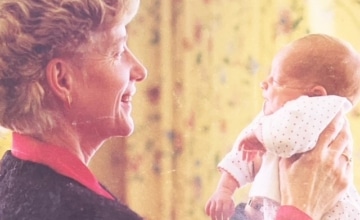Being a part of a military family presents a multitude of unique stresses that are not typically at hand for other families. Military families live in an ongoing state of anxiety and tension, which at times can be significantly emotional and uncertain for everyone in the family. In particular, deployment and homecoming of military family members can create a highly emotional situation that impacts every family member, including those who may be too young to clearly communicate their concerns. For infants and toddlers, the separation or frequent changes often associated with being part of a military family can have a significant impact on their development.
Raising Babies and Toddlers in a Military Family
There are over 300,000 infants and toddlers of active duty members that are ages zero to three.[1] Children in this age range are highly dependent on their relationships with family members and contextual influences that are present in the environment surrounding them. Young children experience the world through their relationships with the important adults in their lives. When parents or caregivers are under stress the emotional lives of their young children are affected. Infants and toddlers rely on their caregivers to serve as emotional regulators, especially during times of stress. If the remaining parent or caregiver is unable to act as a buffering presence during the Service member’s absence, the child may become more vulnerable to the stressors in the environment, leaving healthy development at risk.[2]
The noticeable symptoms of stress for infants and toddlers vary greatly depending on the individual child. Lynette Fraga, Project Director of Military Projects at ZERO TO THREE, explains that indicators of stress for infants can include difficulty with their sleep patterns, irritability, or trouble feeding. Toddlers may regress to previous behaviors, withdraw, or act out. These behaviors may add stress to an already burdened parent, who may not realize that these behaviors are signs that their child needs extra care. Military parents with young children need to be able to easily identify the supports and resources available to them to navigate through these difficult circumstances.
There are many resources available to help strengthen military families that are experiencing difficulties. However, many military family programs and resources are targeted at families with pre-school, school-aged or adolescent children, not always representing the unique needs of babies and toddlers. Military families with infants and toddlers would benefit from an increase in the amount of research and support targeted specifically to their needs. These resources need to be easy to understand and locate, ensuring that parents can access the help they want. Lastly, there must be an increased awareness of infant and toddler developmental stages among military child care professionals, ensuring that stress related symptoms can be recognized and addressed. Through these actions we can ensure that the children of military families are able to grow and develop to their fullest.
The Effects of Deployment on Young Children
One of most challenging times for young children in military families is the deployment of a parent. While the child may be too young to fully understand what has happened, they will still be aware that there has been a dramatic change in their life. It is likely young children will experience a feeling of loss, even at a young age. This feeling of loss and insecurity can lead to a decreased sense of trust, which can have negative impacts on infant and toddler development if not appropriately addressed. Resources describing what a baby might be feeling and offering suggestions to parents to mediate the impacts of the separations are critical during this difficult time. Having one parent absent for a significant period of time affects the relationship between the child and the deployed parent, as well as relationships with the family members at home. The early years are a critical time for attachment and relationships to be built; with a crucial member of the family absent, the child can have a difficult time creating the connections necessary for normal development. As a result of the deployment, the remaining parent will likely feel stressed and overwhelmed, taking over as the leader of the household. This additional stress can cause the remaining parent to be emotionally unavailable and unable to help the infant or toddler who is grieving the loss of the deployed parent.
Throughout the current Iraq War, the hardships associated with the deployment of a family member have been abnormally frequent. Lynette Fraga explains that the Iraq War is unique in that members of the military are likely to face multiple deployments, typically two to four for each individual. Lynette Fraga describes cycle of multiple deployments as a “spiral of deployment,” a term coined by the National Military Family Association. It reflects the ongoing nature of the multiple deployment experience, with families’ not fully realizing reintegration before having to deploy once again.
How to Help
While being physically separated from a young child is challenging, there are ways to make the situation more manageable. Technology may be a benefit to families by offering e-mail, web chats, and other forms of technology to stay connected. Lynette Fraga explains that this is helpful because it allows constant, direct and personal communication. However, at times families describe these communications as adding stress if there are unexpected disruptions, such as slow or broken computer and cell phone connections. Fraga says that resources provided for parents who are being deployed need to focus on ways for parents to be a part of the child’s daily life, keeping them as familiar with each other as possible. These resources need to be easily accessed and understood. Fraga states that the main objective through this support is to always “keep the baby in the mind of the parent, and the parent in the mind of the baby.”[4]
The Effects of Homecoming on Young Children
The return of a family member who has been deployed is a time that is filled with many emotions. Being reunited after a long separation is typically thought of as a time for joy and celebration. However, Lynette Fraga explains that reunification is commonly the most difficult part of the deployment cycle for families.
Since being apart, huge changes will have taken place for the family members who have been at home, as well as the family member who had been deployed. For the family members who have been at home, there has been a shift in responsibilities and daily activities. Infants and toddlers have gone through a significant amount of developmental stages, growing considerably while their Service member parent has been away. When a parent returns and attempts to resume some of their previous roles and responsibilities, the child can become confused and anxious towards the parent, not sure who this person is or why these changes are taking place.
How to Help
Military families need specialized resources and tools to help them cope with the homecoming related experiences they are encountering. Service members returning from Iraq or Afghanistan must have easy access to the resources and supports needed to facilitate healthy reunions in addition to mental health and other services for families challenged by physical or psychological injuries of the Service member. There already is a great amount of support for families who find themselves in circumstances like these. However, sometimes the right support can be hard to locate. In order to make sure that families can get the help they need, policy changes are necessary to ensure that resources are readily accessible.
Policy Recommendations
Service member and family wellness have become a critical factor within the military community. Over the last several years, many services and programs have been integrated into the fabric of support for military families. However, there are still several areas of military family support that could benefit from additional policy consideration and change.
Increase the amount of research focused on infants and toddlers in military families.
More needs to be done to target research efforts on the impacts of deployment, separations, trauma, grief and loss on babies and toddlers. In order to create the best possible practices, practitioners need the best possible empirically based research to support critical and effective resources and interventions. The resources that are designed for military parents to help their children are typically targeted towards older, school-aged or adolescent children. In order for resources to be created for infants and toddlers there first needs to be research and information collected regarding the ways infants and toddlers are impacted in military families. By discovering this specific and important information it will become possible to develop the support that best targets infants and toddlers. This will give parents the ability to help their very young children cope with the separation and reunion that takes place as members of a military family.
Develop cross-agency/organization collaboration plans that centralize information about services available to military families.
Military parents who seek help for infants and toddlers may struggle to find exactly what they are looking for. Lynette Fraga explains that it is often hard for parents to find the type of information they are interested in because the resources that are available can come from a variety of organizations, making them hard to locate. In order to solve this problem, it is important for there to be a unification of the different agencies that work with military children. It is important for states and the federal governments to work together in their efforts to help military children, to make sure that all the information is consistent and centralized to a physical or virtual location that will be easy to find and understand.
Initiate awareness campaigns targeted toward military professionals, which focus on the developmental needs of infants and toddlers.
Lastly, there is a need to increase the awareness of infant and toddler development with military and civilian professionals within the context of our current military family experience. All child and family-serving professionals need information regarding the specific and unique needs of infants and toddlers in military families. By increasing the awareness of infants and toddlers, child care professionals will be given strategies and tools to mediate the difficult circumstances they may encounter. Educating these professionals with detailed knowledge on infant and toddler development will ensure that there is a highly qualified individual working directly with the children and parents.
Conclusion
Improving the resources and information available for military parents and the professionals that support them will improve the help they are able to offer infants and toddlers impacted by deployments. The policy changes discussed above will make it easier for military parents and professionals to understand, recognize, and support military children.
Author: Erin Carroll, Policy Center Intern, ZERO TO THREE July 2009
[1] Office of the Deputy Under Secretary of Defense, Demographics 2007: Profile of the Military Community. U.S. Department of Defense with ICF International, www.icfi.com.
[2] Matthew Melmed, “Supporting Young Children in Military Families.” Statement presented to the Committee on Health, Education, Labor and Pensions and the Committee on Armed Services of the United States Senate, Washington D.C June 24, 2003.
[3] National Military Families Association, Report on the Cycles of Deployment. National Military Families Association, 2005, www.nmfa.org.
[4] Lynette Fraga, Interview, June 30, 2009.




